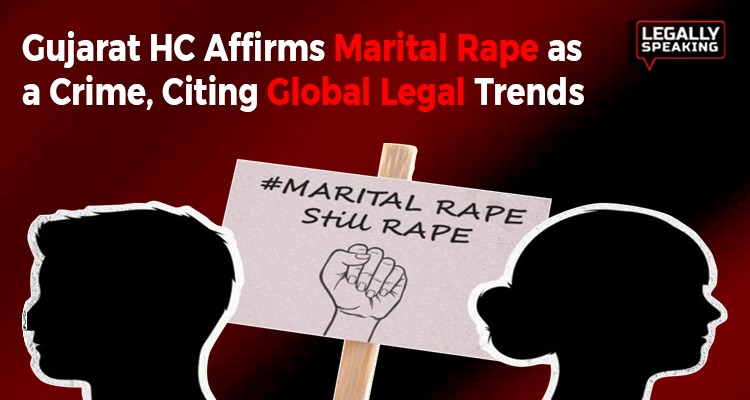
The Gujarat High Court recently emphasized that a rape remains a crime regardless of whether it is committed by the victim’s husband, as observed in the case of Anjanaben Modha vs State of Gujarat.
A bench of Justice Divyesh Joshi pointed out that marital rape is illegal in fifty American States, three Australian States, New Zealand, Canada, Israel, France, Sweden, Denmark, Norway, the Soviet Union, Poland, and Czechoslovakia, among several other nations.
The Court highlighted that even the United Kingdom, from which the Indian Penal Code (IPC) draws inspiration, eliminated the exception to section 376 exempting husbands from rape charges in 1991.
Consequently, the IPC, created by past rulers, has itself abolished the exemption given to husbands, making a man liable to punishment under Section 376 for sexually assaulting or raping a woman.
The bench emphasized that the common practice of exempting husbands from certain acts is untenable, stating, “A man is a man; an act is an act; rape is rape, be it performed by a man, the ‘husband,’ on the woman, the ‘wife.'”
The Court also addressed the need to change the social attitude of trivializing or normalizing offenses such as eve-teasing and stalking with phrases like ‘boys will be boys.’
Furthermore, the Court discussed the various forms of sexual violence, ranging from aggravated rape to offenses under different penal enactments like stalking and eve-teasing.
The judge criticized the tendency to trivialize or romanticize such crimes, emphasizing their lasting and pernicious effects on survivors.
The Court stressed the importance of breaking the ‘silence’ on gender violence, noting that gender violence is often hidden due to factors such as unequal power dynamics, cultural norms, economic dependence, poverty, and alcohol consumption.
In India, reporting such crimes is hindered by economic dependence on family and fear of social ostracization, leading to unreported cases and a higher actual incidence of violence against women.
The observations were made in the context of dismissing a bail application related to charges of rape, outraging modesty, cruelty, and criminal intimidation filed against a woman, her husband, and son.
The case involved allegations of recording and uploading explicit content of the complainant’s daughter-in-law on a porn website.
The Court highlighted the need for men, more than women, to play a role in preventing and combating violence against women.
These strong remarks were made during the dismissal of a bail application where a woman, along with her husband and son, faced charges of rape, outraging modesty, cruelty, and criminal intimidation.
The Rajkot Cyber Crime Police had also invoked relevant charges under the Information and Technology Act.
The prosecution’s case involved the daughter-in-law accusing her husband and parents-in-law of recording her explicit videos and photos and uploading them on a porn website.
The complainant alleged that her father-in-law instigated her husband to engage in such acts for financial gain.
Despite her objections and complaints to her in-laws, they conspired with her husband, forcing her to be recorded on camera.
The complainant claimed that her husband engaged in “unnatural” acts under his parents’ influence.
The motive behind these acts was allegedly financial, aimed at avoiding the sale of their hotel during a financial crisis.
After considering the facts, Justice Joshi found that the applicant mother-in-law was aware of the sexual assault and harassment inflicted on the complainant.
Regardless of the reasons behind such heinous acts, the judge emphasized the need for strict criticism and punishment to prevent the commission of similar offenses in the future, ultimately denying bail to the applicant.




